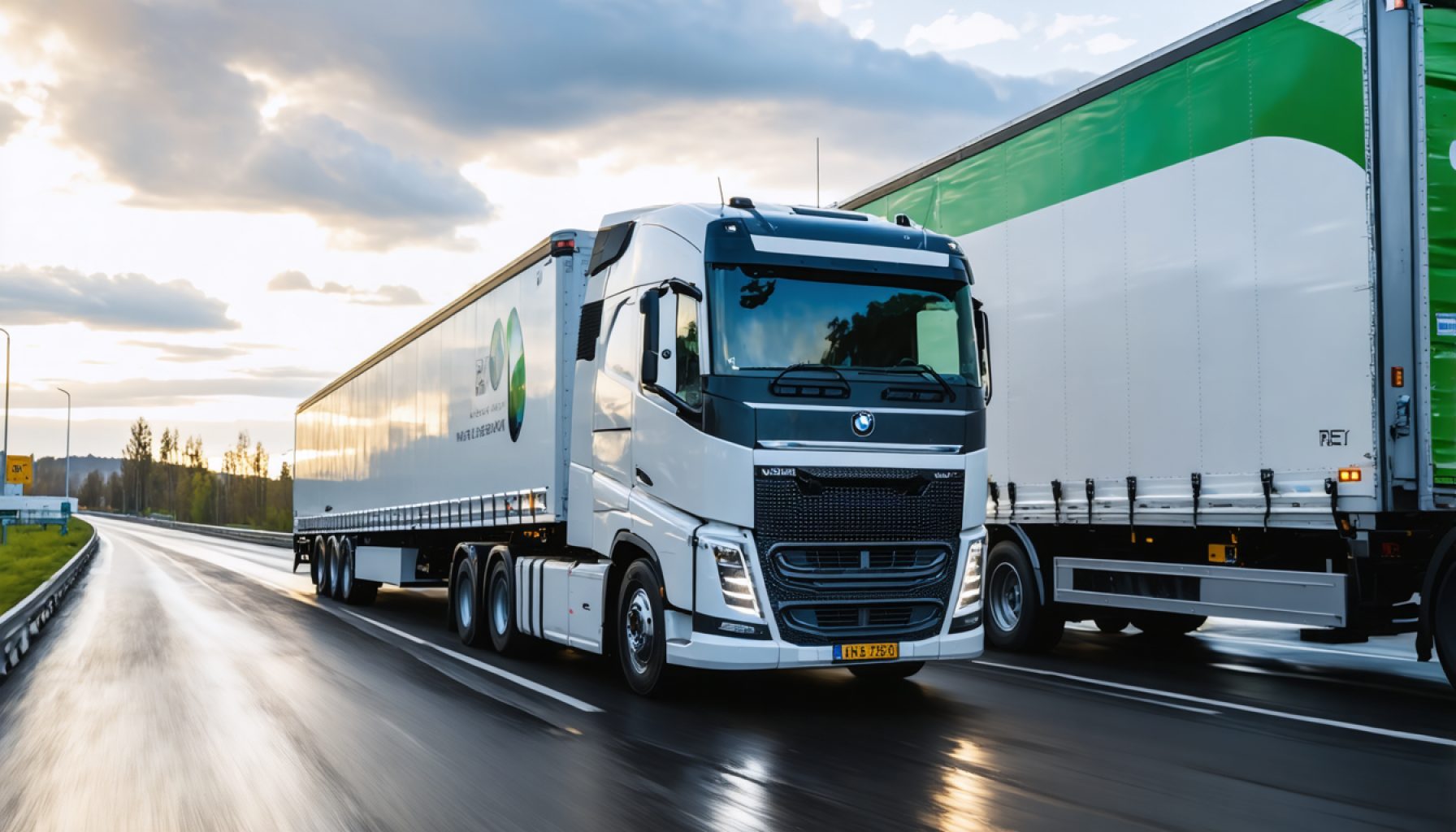- BMW is pioneering hydrogen mobility with emission-free, fuel cell-powered trucks in Europe.
- This initiative is part of the H2Haul project, in collaboration with IVECO, DHL, and TEAL Mobility.
- State-of-the-art hydrogen fueling stations in Leipzig and Hormersdorf support these trucks, showcasing practical integration with existing infrastructure.
- The project emphasizes reducing emissions in freight transport, steering towards a decarbonized future.
- Data from these trucks will inform their broader adoption, aiding in making emission-free travel commonplace.
- The adaptability of hydrogen trucks, without charging station dependencies, positions them for eco-friendly logistics.
- BMW also utilizes hydrogen for in-house logistics, highlighting Leipzig’s significant fuel cell-driven industrial fleet.
- This venture illustrates BMW’s commitment to innovation through evolutionary, not revolutionary, integration of technology.
Giant, emission-free trucks are rolling onto Europe’s roads, driven by BMW’s audacious leap into hydrogen mobility. These aren’t just trucks; they’re lifelines to a sustainable future. Against Germany’s picturesque landscape, laden with dense forests and bustling cities, the roads between Leipzig, Landsberg, and Nuremberg host a new kind of traveller — hydrogen-powered behemoths that hum with quiet efficiency.
These fuel cell trucks signify a groundbreaking phase in BMW’s collaboration with IVECO, DHL, and TEAL Mobility under the ambitious H2Haul project. Not limited to flashy prototypes, these vehicles embody practicality, now bolstered by state-of-the-art hydrogen fueling stations in Leipzig and Hormersdorf, offering a glimpse into the seamless future of logistics.
Imagine the vivid interplay of dust and light as these trucks rumble past, silently challenging conventional diesel giants. The essence of the H2Haul initiative is simple yet profound: disentangle freight transport from emissions, paving a road to decarbonized heavy traffic.
As BMW harnesses hydrogen’s potential, it exemplifies an openness to diverse technologies, integrating seamlessly with existing infrastructures. The data gathered from these titanic hydrogen vessels will chart the course for their widespread adoption, making long, emission-free journeys a norm, not an exception.
The adaptive nature of these hydrogen trucks, without the tether of charging stations, projects them as agile participants in an eco-friendly future. Beyond trucks, hydrogen infiltrates BMW’s in-house logistics, lighting up Leipzig with one of Europe’s largest fleets of fuel cell-driven industrial movers.
BMW’s daring venture into hydrogen asserts a radical takeaway: innovation often rests not in unrestrained revolution but in deliberate evolution, merging tradition with technology to sculpt a sustainable tomorrow.
You Won’t Believe How Hydrogen Trucks Are Revolutionizing European Roads!
How Hydrogen Trucks Are Driving the Future of Sustainable Freight
The landscape of freight transportation is transforming, and hydrogen-powered trucks are at the forefront of this change. As BMW and its partners venture into hydrogen mobility, this innovation is reshaping logistics across Europe. Below, we delve into various aspects of hydrogen trucks, exploring their potential, market impact, challenges, and future prospects.
How-To Steps & Life Hacks for Embracing Hydrogen Trucks
1. Infrastructure Development: Invest in hydrogen refueling stations, a critical component to support hydrogen truck operation.
2. Fleet Transition Planning: Evaluate the existing fleet and decide on a phased transition to hydrogen to minimize operational disruptions.
3. Training Programs: Implement training for drivers and maintenance staff to ensure safety and efficiency.
4. Supply Chain Optimization: Use insights from real-time data to optimize supply chain logistics with the capability of long-range emission-free travel.
Real-World Use Cases
1. Urban Freight Delivery: Cities like Leipzig can benefit from hydrogen trucks for cleaner air and quieter streets.
2. Long-Distance Hauls: With significant range capabilities, hydrogen trucks are ideal for routes between major European cities without the need for frequent refueling.
3. Industrial Zone Applications: They can be used within industrial areas for internal logistics, reducing carbon footprints.
Market Forecasts & Industry Trends
The market for hydrogen trucks is promising, with projections estimating exponential growth over the next decade. According to a report by MarketsandMarkets, the hydrogen fuel cell vehicle market is expected to grow from $1.2 billion in 2020 to $42 billion by 2030. Emerging trends include increased government investments in hydrogen infrastructure and collaborations among automotive giants for research and development.
Controversies & Limitations
1. Hydrogen Production: The majority of hydrogen is currently produced using fossil fuels, which tempers its eco-friendly status.
2. Infrastructure Costs: High initial investment in infrastructure can be a deterrent.
3. Energy Efficiency: Hydrogen fuel cells are less efficient compared to electric batteries in terms of energy conversion.
Features, Specs & Pricing
– Range: Hydrogen trucks can cover up to 400 miles on a single tank.
– Refueling Time: Quick refueling times similar to diesel, around 15 minutes.
– Pricing: Initially higher due to technology and limited production but expected to decrease with scale.
Security & Sustainability
– Safety: Hydrogen vehicles incorporate multiple safety systems to manage hydrogen’s flammability.
– Sustainability: Potential for green hydrogen, produced via renewable energy, to make the entire lifecycle sustainable.
Insights & Predictions
– Adoption Timeline: Expect to see significant adoption by 2030, particularly in countries proactive in renewable energy and emissions regulations.
– Technology Integration: Combining hydrogen with battery technology for hybrid solutions could be a trend setter.
Pros & Cons Overview
Pros:
– Zero-emissions
– Quick refueling
– Long range
Cons:
– Limited infrastructure
– High initial costs
– Current reliance on grey hydrogen
Actionable Recommendations
1. Stakeholder Collaboration: Engage governments, industries, and startups to drive research and promote hydrogen infrastructure.
2. Pilot Programs: Test hydrogen trucks in varied environments to tailor best practices and operational efficiencies.
3. Public Awareness Campaigns: Educate stakeholders on the benefits and safety of hydrogen technology to foster acceptance.
For more information on hydrogen mobility and innovation, visit BMW Group for the latest updates in sustainable transportation technologies.









